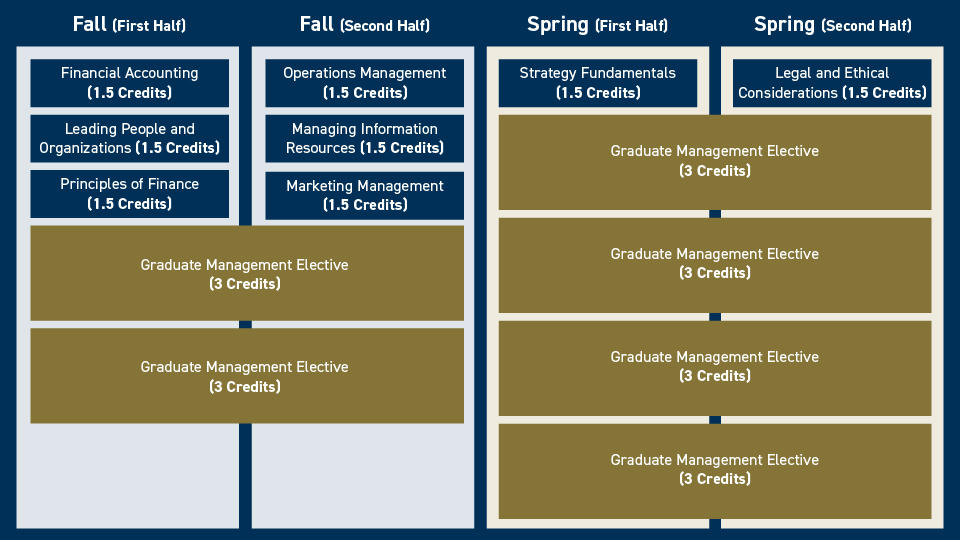Dynamic curriculum is at the core of any graduate program. Scheller’s M.S. Major in Management core coursework covers eight academic areas, including Accounting, Finance, IT Management, Law and Ethics, Marketing, Operations Management, Organizational Behavior, Strategy and Innovation.
The faculty for these core courses share their passion for teaching and the impact their classes can have for early career students seeking greater business experience.

MGT 8812: Financial Accounting
Ryan Blunck, Senior Lecturer, Accounting

What is a fun fact you’d like to share to help students get to know you?
I love accounting and I love teaching! It's convenient that my job at Georgia Tech lets me do both. Let's go!
What do you love most about accounting?
High quality accounting is essential to a well-functioning economy! The information created by the financial accounting system allows investors to make well-informed decisions. With good information, people with money (investors and creditors) can identify investments with honest, smart people and good ideas. These high-quality investments create great things, and everyone benefits!
Please give a short overview of the course you’ll be teaching in the core.
In the core financial accounting course, students will learn to understand financial statements. With this knowledge, students will begin to understand how businesses function and how to use this information to make a variety of decisions.
How will completing this course help someone in their early career?
Understanding accounting is important for every businessperson. This course will help you improve your understanding of the information you need to do your job better.
MGT 6504: Principles of Finance
Jonathan Clarke, Senior Associate Dean for Strategic Initiatives and Associate Professor of Finance

What is a fun fact you’d like to share to help students get to know you?
I’ve been a Scheller professor for almost 25 years. I’m a big fan of Georgia Tech athletics, especially the baseball team. I served on the Georgia Tech Athletic Association Board of Trustees for several years.
What do you love most about finance?
I love finance because it provides a unique blend of analytical rigor and strategic thinking. The dynamic nature of finance keeps me engaged, and I am constantly learning. Finance also has a profound impact on both the lives of individuals and on global economies.
Please give a short overview of the course you’ll be teaching in the core.
I’ve taught this course for more than 20 years. The thing I like most about the course is that we start from basic principles like why $1 today is worth more than $1 in the future. From some of these fundamental ideas, we can value a whole range of assets like stocks, bonds, and privately held companies. These tools are also useful in evaluating common financial decisions like whether to buy vs. rent or whether to re-finance an existing mortgage.
How will completing this course help someone in their early career?
A strong understanding of finance is a critical component of being an effective leader. Leaders need to be able to understand the impact of their decisions on free cash flow, and ultimately, the value of their firm.
MGT 6503: Managing Information Resources
Marius Florin Niculescu, Associate Professor, IT Management

What is a fun fact you’d like to share to help students get to know you?
My dog occasionally shows up during virtual office hours.
What do you love most about IT management?
Information technology is changing very fast. I have to keep up with it as well. This ensures that I do not get bored.
Please give a short overview of the course you’ll be teaching in the core.
The course has a dual objective.
First, it introduces students to some of the emerging trends and business models, opportunities, transformations, and/or challenges faced by many companies and industry sectors due to the advances, interconnectedness, and ubiquity of information technology.
Second, the course introduces students to several relevant hands-on data management and analytics tools and techniques that facilitate data-driven decision making.
How will completing this course help someone in their early career?
Concepts from the course are immediately applicable to consulting, business analytics, management of IT strategies, digital transformation, and project management.
MGT 6509: Legal and Ethical Considerations
Steve Salbu, Cecil B. Day Chair in Business Ethics, Law and Ethics

What is a fun fact you’d like to share to help students get to know you?
Approaching the end of my seventh decade on this planet, I still pull all-nighters, including for grading all my graduate and undergraduate student assignments.
What do you love most about law and ethics?
The topics are very timely and controversial, making for fascinating discussions in class. I especially love how much I continue to learn from my students during these class sessions. It’s a real privilege to spend so much time with some of the brightest young minds to be found anywhere.
Please give a short overview of the course you’ll be teaching in the core.
The class is a combination of ethical cases for discussion and legal concepts important for any businessperson to be aware of. We talk about things like the ethics of sweatshops, ethical issues relating to the environment and sustainability, and legal issues around equal employment opportunity, product liability, insider trading, etc.
How will completing this course help someone in their early career?
Ethics is like any other subject: sound ethical decision-making is often difficult and having practice analyzing tough ethical challenges helps build your ability to reason carefully and objectively. The course will also help graduates avoid some of the riskiest legal pitfalls that sometimes get people into trouble due to lack of awareness of the legal environment.
MGT 6505: Marketing Management
Timothy Halloran, Principal Lecturer, Marketing

What is a fun fact you’d like to share to help students get to know you?
Before academia, I was a classically trained brand marketer at Coca-Cola where I spent 11 years. At Coca-Cola, I launched the Powerade brand nationally using its role as the “Official sports drink of the 1996 Olympics” as the platform. I also worked on the development of Dasani and Gold Peak Tea and Coke’s first internet initiative with Cherry Coke.
What do you love most about marketing?
I love that marketing is a “whole brain” activity. A myth that I always try to bust on the first day of class is: “Marketing is NOT advertising.” Marketing is about creating value for the customer, the company, and your collaborators.
To succeed, you must understand data and analytics about consumers and customers, think strategically and creatively about the plans you will implement into the marketplace, and decide on the actions the business will take to achieve the marketing objectives that you have developed.
Please give a short overview of the course you’ll be teaching in the core.
I teach Marketing Management, which is the core marketing course. My goal in the course is to provide students with an overarching view of marketing, with a particular focus on the strategic decisions that marketing managers must make to achieve their objectives.
It is a survey course, so we will give students a brief taste of all the different elements that constitute “marketing,” which I hope will spark their interest in the discipline and result in them digging deeper with specific electives.
How will completing this course help someone in their early career?
There was a famous article out in Harvard Business Review many years ago, and I think it still is applicable. The article was called “Marketing Is Everything” and in fact, it really is. If you don’t understand your customer and their needs, your competitors, and if you can’t provide differentiated value to your customer, your product or service is merely a commodity and can be instantly replaced by another.
However, if you can create a value proposition that is truly valued by your target market, you’ll win. Regardless of where you go in an organization, you must understand marketing because the relationship with the customer is everyone’s job.
MGT 6501: Operations Management
Morvarid Rahmani, Associate Professor, Operations Management

What is a fun fact you’d like to share to help students get to know you?
I've earned three master’s degrees in three different areas. Each degree has given me a new perspective and opened my eyes to new possibilities. Over the years, I've applied the knowledge I gained from these degrees in my teaching, research, and industry projects.
Whether it's your first, second, or third master’s degree, know that you'll never regret the journey.
What do you love most about operations management?
What I love most about operations management is its central role in every organization's success. From process and inventory planning to supply chain management, operations management is a dynamic field with constant new developments that directly impact real-world practices.
Please give a short overview of the course you’ll be teaching in the core.
The course aims to provide you with a conceptual framework and a set of analytical tools to understand the behavior of processes within organizations. Topics covered include operations strategy, process analysis, service management, supply chain management, inventory planning, and assessing social and environmental impact.
How will completing this course help someone in their early career?
Completing this course will be invaluable for someone in their early career. It introduces fundamental concepts, opportunities, and challenges in operations management, essential knowledge for any general manager or consultant. Understanding these concepts equips you to make wise decisions benefiting your organizations and advancing your careers.
MGT 6502: Leading People and Organizations
Katie Badura, Assistant Professor, Organizational Behavior

What is a fun fact you’d like to share to help students get to know you?
I was a Division I athlete at Iona College. I ran on the cross country and track teams. My proudest team accomplishment was running a sub-five mile on an indoor track. A lot of my passion for becoming an organizational behavior professor is rooted in my experiences as an athlete.
What do you love most about organizational behavior?
We give employees a road map for how to be successful in the workplace, and managers a road map that can help them to more effectively lead people and teams.
Please give a short overview of the course you’ll be teaching in the core.
Across the half semester, I cover six core topics including: leadership, motivation, creativity/innovation, decision making, conflict management, and organizational culture/change. For each content area, there is a lecture day and then a case day where we apply the lecture material to real world situations.
I personally have a lot of fun teaching the class as it is highly interactive, and the learning is largely guided by enriching discussion among students.
How will completing this course help someone in their early career?
While this class is framed from the perspective of leading others, the concepts we cover can help all employees in the workforce. For instance, the course content can help pinpoint what motivates you, which can largely guide the jobs you take early in your career. Likewise, conflict is something most employees face in their work week, thus knowing how to manage it can be a helpful tool in your arsenal.
Collectively, the content we talk about will help you hit the ground running as you enter the workforce and may also help you to be seen as a potential future leader in your company.
MGT 6518: Strategy Fundamentals
Anne Fuller, Senior Lecturer, Strategy and Innovation

What is a fun fact you’d like to share to help students get to know you?
I am a Triple Jacket with a degree from three different colleges at Georgia Tech. These include Engineering, Ivan Allen, and Scheller.
What do you love most about strategy and innovation?
We analyze complex and current business challenges that span a variety of different functions in the company to enhance the organization's performance.
Please give a short overview of the course you’ll be teaching in the core.
The course covers concepts and frameworks for strategy analysis and formulation. We will apply these basics to businesses both current and historical to evaluate the long-term implications of business decisions in a dynamic external environment.
How will completing this course help someone in their early career?
Strategic management integrates perspectives on how firms gain and sustain competitive advantage. This is invaluable in developing diverse perspectives related to problem solving a wide range of current business concerns, particularly in environments of rapid changes.
